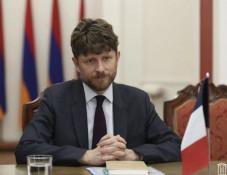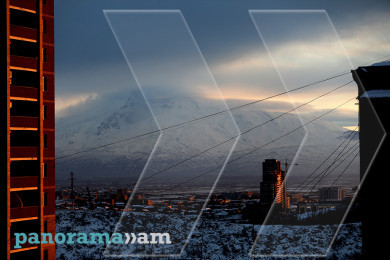
American political scientist: Western Intelligence used Azerbaijan to export terrorism into Russia
F. William Engdahl - strategic risk consultant and lecturer, Princeton University politics degree-holder - confirmed Russian President Vladimir Putin’s statement – made in a documentary aired by Russia 1 TV channel on 26 April, 2015 – about the direct contacts between the North Caucasus militants and the representatives of the American Special Service in Azerbaijan. Engdahl’s article is published on the online magazine New Eastern Outlook.
According to the article, the CIA and western Intelligence services deliberately back terror in the Caucasus to weaken Russia. “In the early 1990s, Dick Cheney’s company, Halliburton, had surveyed the offshore oil potentials of Azerbaijan, Kazakhstan, and the entire Caspian Sea Basin. They estimated the region to be ‘another Saudi Arabia’ worth several trillion dollars on today’s market. The US and UK were determined to keep that oil bonanza from Russian control by all means. The first target of Washington was to stage a coup in Azerbaijan against elected president Abulfaz Elchibey to install a President more friendly to a US-controlled Baku–Tbilisi–Ceyhan (BTC) oil pipeline, ‘the world’s most political pipeline,’ bringing Baku oil from Azerbaijan through Georgia to Turkey and the Mediterranean,” Engdahl claims.
At that time, the only existing oil pipeline from Baku was a Soviet era Russian pipeline that ran through the Chechen capital, Grozny, taking Baku oil north via Russia’s Dagestan province, and across Chechnya to the Black Sea Russian port of Novorossiysk. The pipeline was the only competition and major obstacle to the very costly alternative route of Washington and the British and US oil majors, according to Engdahl.
He claims that President Bush Sr. gave his old friends at CIA the mandate to destroy that Russian Chechen pipeline and create such chaos in the Caucasus that no Western or Russian company would consider using the Grozny Russian oil pipeline. The CIA used the former Deputy Assistant Secretary of Defense, General Richard Secord, for the operation. He landed in Baku in 1991 and set up the CIA front company, MEGA Oil. In Azerbaijan, he setup an airline to secretly fly hundreds of bin Laden’s al-Qaeda Mujahideen from Afghanistan into Azerbaijan. By 1993, MEGA Oil had recruited and armed 2,000 Mujahideen, converting Baku into a base for Caucasus-wide Mujahideen terrorist operations.
General Secord’s covert Mujahideen operation in the Caucasus initiated the military coup that toppled elected president Abulfaz Elchibey that year and installed Heydar Aliyev, a more pliable US puppet. A secret Turkish intelligence report leaked to the Sunday Times of London confirmed that “two petrol giants, BP and Amoco, British and American respectively, which together form the AIOC (Azerbaijan International Oil Consortium), are behind the coup d’état,” according to Engdahl’s article.
Further the political scientist claims that Saudi Intelligence head, Turki al-Faisal, arranged that his agent, Osama bin Laden, whom he had sent to Afghanistan at the start of the Afghan war in the early 1980s, would use his Afghan organization Maktab al-Khidamat (MAK) to recruit “Afghan Arabs” for what was rapidly becoming a global Jihad. Bin Laden brought in another Saudi, Ibn al-Khattab, to become Commander, or Emir of Jihadist Mujahideen in Chechnya (sic!) together with Chechen warlord Shamil Basayev. No matter that Ibn al-Khattab was a Saudi Arab who spoke barely a word of Chechen, let alone, Russian. He knew what Russian soldiers looked like and how to kill them.
They spread al-Qaeda’s hardline Islamist ideology across the Caucasus. Under Secord’s guidance, Mujahideen terrorist operations had also quickly extended into neighboring Dagestan and Chechnya, turning Baku into a shipping point for Afghan heroin to the Chechen mafia, the expert writes.
According to Yossef Bodansky, then Director of the US Congressional Task Force on Terrorism and Unconventional Warfare, Washington was actively involved in “yet another anti-Russian jihad, seeking to support and empower the most virulent anti-Western Islamist forces.” Bodansky revealed the entire CIA Caucasus strategy in detail in his report, stating that US Government officials participated in “a formal meeting in Azerbaijan in December 1999 in which specific programs for the training and equipping of Mujahideen from the Caucasus, Central/South Asia and the Arab world were discussed and agreed upon, culminating in Washington’s tacit encouragement of both Muslim allies (mainly Turkey, Jordan and Saudi Arabia) and US ‘private security companies’. . . to assist the Chechens and their Islamist allies to surge in the spring of 2000 and sustain the ensuing Jihad for a long time…Islamist Jihad in the Caucasus as a way to deprive Russia of a viable pipeline route through spiraling violence and terrorism,” Engdahl cites Bodansky.
Basayev was a key part of the CIA’s Global Jihad. In 1992, he met Saudi terrorist Ibn al-Khattag in Azerbaijan. From Azerbaijan, Ibn al-Khattab brought Basayev to Afghanistan to meet al-Khattab’s ally, fellow-Saudi Osama bin Laden. Ibn al-Khattab’s role was to recruit Chechen Muslims willing to wage Jihad against Russian forces in Chechnya on behalf of the covert CIA strategy of destabilizing post-Soviet Russia and securing British-US control over Caspian energy. Once back in Chechnya, Basayev and al-Khattab created the International Islamic Brigade (IIB) with Saudi Intelligence money, approved by the CIA and coordinated through the liaison of Saudi Washington Ambassador and Bush family intimate Prince Bandar bin Sultan. Basayev and al-Khattab imported fighters from the Saudi fanatical Wahhabite strain of Sunni Islam into Chechnya. Ibn al-Khattab commanded what were called the “Arab Mujahideen in Chechnya,” his own private army of Arabs, Turks, and other foreign fighters, according to Engdahl.
The Saudi and CIA-financed Islamic International Brigade was responsible not only for terror in Chechnya. They carried out the October 2002 Moscow Dubrovka Theatre hostage seizure and the gruesome September 2004 Beslan school massacre. By late 2004, in the aftermath of the tragic Beslan drama, President Vladimir Putin reportedly ordered a secret search and destroy mission by Russian intelligence to hunt and kill key leaders of the Caucasus Mujahideen of Basayev. Al-Khattab had been killed in 2002. The Russian security forces soon discovered that most of the Chechen Afghan Arab terrorists had fled. They had gotten safe haven in Turkey, a NATO member; in Azerbaijan, by then almost a NATO Member; or in Germany, a NATO Member; or in Dubai–one of the closest US Allies in the Arab States, and Qatar-another very close US ally. In other words, the Chechen terrorists were given NATO safe haven, Engdahl writes.
Newsfeed
Videos






























